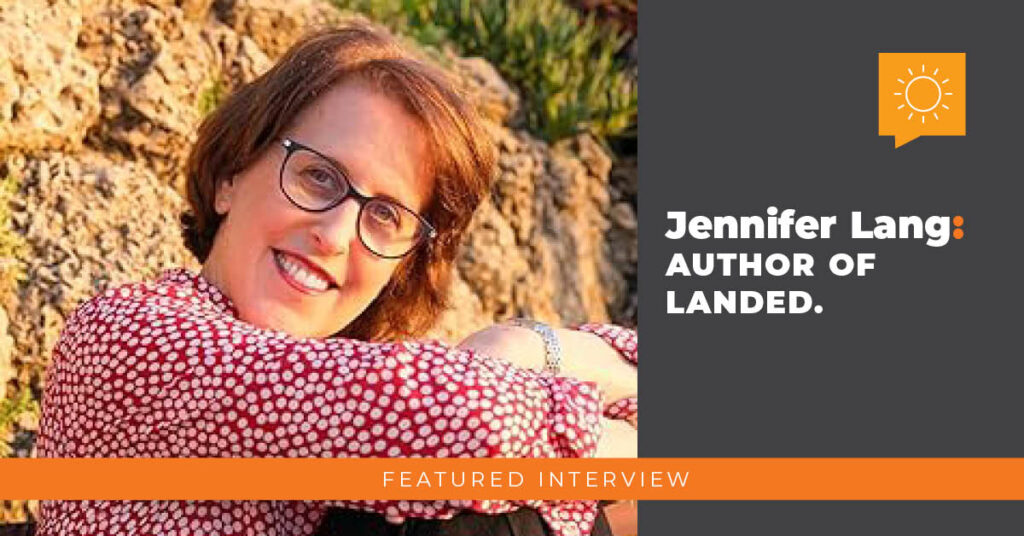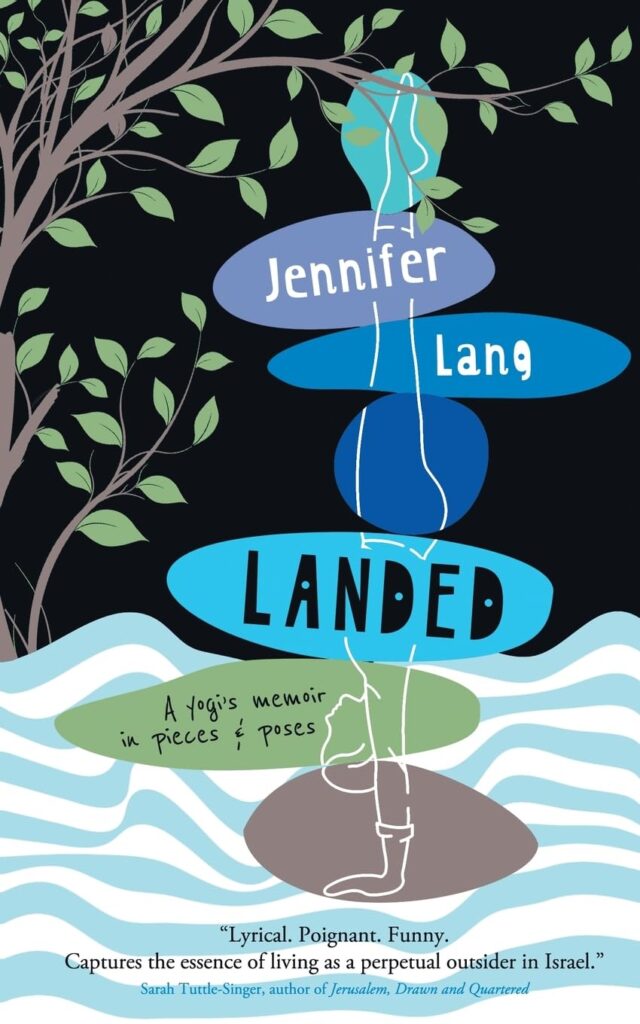By Christina Consoling

Author Jennifer Lang is a self-described “American-French-Israeli hybrid” who writes about “identity, language, home,” and belonging. She also runs Israel Writers Studio, a “home for English-language creative writers” that is based in Tel Aviv, where she currently lives. She recently launched her second memoir, Landed: A yogi’s memoir in pieces & poses, which is poignant, humorous, genuine, and relatable. Jennifer shared with me a little bit about about her intentions for and approach to writing.
Landed: A yogi’s memoir in pieces & poses is your second memoir. What draws you to that genre in particular? How do you determine what story you’re going to tell?
JL: Creative nonfiction is the umbrella term that holds a multitude of truth-telling genres: memoir, personal essay, immersive journalism, and more. I have always been drawn to telling the truth (especially as a younger sister to a bossy older brother, me playing the role of tattle-teller to our parents) and playing by the rules, which go hand in hand. I was never comfortable on stage, doing theatre, taking on a different role, being someone else. Maybe it’s my genetic make-up, the way I’m wired.
Deciding what story to tell is not obvious and feels more like trial and error. I don’t know many writers who land the story on the first or second draft. In the case of Landed, I started and stopped several times over years, beginning with a 95K-word manuscript, eventually finding my way through the dark, dense woods, ending with two books with different focal points, answering different questions, totalling 55K words. They are compact, compressed, concise, more befitting to the way I began writing during periods of ebb and error. The first book is a marital search for home, while the second is a late-in-life coming-of-age.
One reviewer said of Landed that it “provides the reader with a realistic and multilayered Jewish woman” and “we can turn to a book like Landed for an honest depiction of a woman who encompasses many things, including being Jewish.” That’s high praise, but with the rise in antisemitism around the globe, did you have any reservations about publishing this second work?
JL: Unfortunately, yes. Loads of reservations. Gobs of doubt. Nights of no sleep. Gazillions of maybe-I-shouldn’t thoughts.
In some ways, it’s as if I set myself up for failure by putting this book into this world, while in others, it feels imperative to not let anyone silence me, us, the Jewish writers in the literary world. Not now, not ever. Ironically, my first book is a story of voice so it is even more crucial to make myself heard loud and clear, strong and proud.
With respect to your first book, Places We Left Behind: a memoir-in-miniature, Literary Titan said of the work, “While it isn’t necessarily a self-help book, readers stand to gain invaluable insights from Lang’s resilient coping mechanisms and indomitable courage in the face of grave adversities.” How do you feel about this comparison? Was it something you set out to do right from the beginning?
JL: Reading reviews of both books has been enlightening. Each time I read one, I learn even more about my own work. For that, I am grateful.
I do not consider myself brave or courageous. Even the word resilient rubs me wrong. Yet, resilience is a theme running throughout my second book. After hearing Sherri Mandell, author of The Road to Resilience: From Chaos to Celebration, explain that resilience isn’t about being strong, but rather first being weak, “shattering when you need to, knowing there will be others to help pick you up,” I understood that resilience is my superpower. I know how to fall apart; I cry with abandon. I turn to others—my spouse, my friends—to help hold me up.
All that said, my coping mechanisms are many. The default is crying, but with age and experience, I’ve mastered others as well: compartmentalization, denial, a dash of mindfulness, and, thanks to yoga, intentional breathing.
You play with form and structure in your writing. How do you decide on what form/structure suits the story? When in the writing process does this occur?
JL: Form and structure are my go-to, at my times my MO. I am a Virgo, type A, tightly wound, in need of yoga, in need of boundaries and structure and systems both in my professional and my personal lives to help me deal with what oftentimes feels like overwhelm.
Places is a straight linear story told in present tense, while Landed flips between present, past, and [yoga] poses. In the case of the second book, I started with the structure, which is more complex and daring and ambitious than the first. Once I realized it was a seven-year story—a very meaningful number in both yoga and Judaism—I envisioned seven lengthy year-long sections, each full of a differing number of short chapters, and each separated by a story of the seven chakras, as I learned them in the 90s with my first teacher, Rodney Yee. I could have omitted the chakra sections but felt the text begged for them, to show the connection between the ancient mind-body practice, its effect on me and my mind and body and lived experience.
I feared the structure would be the manuscript’s downfall. Until, one day, in 2022, I got an offer of publication from Vine Leaves Press and a big, fat, bold YES.
Your writing is visual, too—not just words on a page but charts and lists, etc. Those everyday tools lend, in my opinion, an intimacy to your work. What was your intention on including these visual elements?
JL: I love that you think my everyday tools lend an intimacy to my work. That makes me smile.
The playful, experimental prose was my doing; while it was intentional at first (after seeing some small indie presses say “open to experimental prose”), it quickly became organic as if the text was longing to be bent and shaped, revised and re-visioned. My yen was to create something sui generis, something that readers won’t easily forget.
On some level, I sensed that the story was too dramatic and intense and needed lightening. Pushing the boundaries of words and using symbols and other crazy devices (caption bubbles, redaction, T-F quiz) helps release some of the tension. They are my attempt to imitate others who have gone before me, first and foremost, the late Amy Krouse Rosenthal, author of Encyclopedia of an Ordinary Life.
Memoirists find meaning in past experiences and pass that meaning onto readers. Did writing about your experiences reveal anything you weren’t aware of before you began writing?
JL: Writing revealed what yoga represents in my life, which might be obvious and sought after for some, but something I was resisting. Ever since my inherited religion (Judaism) became more negative and oppositional (through my sibling, in my marriage), I battled with and felt bombarded by religion and spirituality. That said, throughout the two decades of teaching yoga, my students often said they saw me as spiritual. Many people need some kind of framework—whether organized religion or nature or other—to understand how to live, how to behave, how to respond. Through writing, I understood that Judaism is to some (my spouse, my sibling) as yoga is to me.
I also realized that while I described myself as female, American, Jew as a teenager, I see myself clearly today as Jew. The world has made it obvious that that’s front and center and all that counts.
Your stories are specific to you, but the universal themes help readers relate to them. How difficult is it to find that proper balance between specific and universal?
JL: Landed is about identity and self-acceptance, and while it’s not an issue for some women it’s unfortunately common for others. I find it especially so for those who married young and became mothers and played traditional roles as primary caretaker. It is too easy to lose oneself and one’s sense of purpose, often only waking up to ask who am I in the early fifties. I strived to weave these themes throughout the story and hope I achieved that.
The relationship between the US and Israel is complicated, and much of what we see here in the US is through the media’s lens. What’s something you want people to know about life in and the people of Israel?
JL: Thank you for asking this question. When I sat down to write Landed, I was on a mission: to write about Israel for anyone, primarily non-Jews, who know little or nothing about the country, to see what the daily life is like, to understand what it’s like to be surrounded by enemies and hear air-raid sirens and run for shelter, to live history in real time in a very misunderstood and complex country in a capricious region.
With both books, I try not to make assumptions about what a reader knows about where I live. In Places, I use footnotes to explain the inanity of Jewish law; in Landed, I use endnotes for readers who are curious enough to read to the last page. My greatest hope is that readers are open-minded to both the playful form and the controversial (at times) content.
What’s next for you?
JL: Now that I’ve written my story and published two books—Places We Left Behind: a memoir-in-miniature and Landed: A yogi’s memoir in pieces & poses—I am eager to free myself from the truth. To imagine it here and there. To try my hand at historical fiction. To tell the story of my late grandfather, who fled antisemitism under Czar Nicolas II and emigrated from Russia to San Francisco circa 1918, and helped build the Jewish community while witnessing the building of the City by the Bay. And, as someone who hosted me on their podcast recently pointed out, my Zayde’s story isn’t so different from mine. Like mine, his is one of identity and search for home, two of my all-time favorite themes.

Landed
Jennifer Lang
“Lyrical. Poignant. Funny. Captures the essence of living as a perpetual outsider in Israel.” Sarah Tuttle-Singer, author of Jerusalem, Drawn and Quartered
American-born Jennifer traces her journey-both on and off the yoga mat-reckoning with her adopted country (Israel), midlife hormones (merciless), cross-cultural marriage (to a Frenchman) and their imminent empty nest (a mixed blessing), eventually realizing the words her yoga teachers had been offering for the past twenty-three years: root down into the ground and stay true to yourself. Finally, she understands that home is about who you are, not where you live. Written in experimental chapterettes, Landed spans seven years (and then some), each punctuated with chakra wisdom from nationally-acclaimed Rodney Yee, her first teacher.

